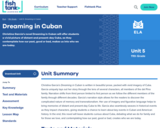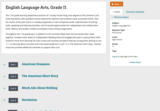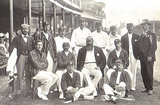
In this video segment from Nature, crabs face numerous obstacles in their migration from their forest home to the Caribbean Sea. [4:09]
- Subject:
- Science
- Material Type:
- Audio/Video
- Lesson
- Provider:
- PBS LearningMedia
- Date Added:
- 12/01/2022

In this video segment from Nature, crabs face numerous obstacles in their migration from their forest home to the Caribbean Sea. [4:09]

Christina Garcia's novel Dreaming in Cuban will offer students a vivid picture of distant and present-day Cuba, as they contemplate how our past, good or bad, makes us into who we are today.

The 11th grade learning experience consists of 7 mostly month-long units aligned to the Common Core State Standards, with available course material for teachers and students easily accessible online. Over the course of the year there is a steady progression in text complexity levels, sophistication of writing tasks, speaking and listening activities, and increased opportunities for independent and collaborative work. Rubrics and student models accompany many writing assignments.Throughout the 11th grade year, in addition to the Common Read texts that the whole class reads together, students each select an Independent Reading book and engage with peers in group Book Talks. Students move from learning the class rituals and routines and genre features of argument writing in Unit 11.1 to learning about narrative and informational genres in Unit 11.2: The American Short Story. Teacher resources provide additional materials to support each unit.

People often say that mankind should learn from history. Charles Dickens, whose books are considered classics, set his novel A Tale of Two Cities in the past. He wanted his readers to learn from the bloody French Revolution and from the widespread brutality in London. Both cities (Paris and London) offer the reader a glimpse into dark and dangerous times. As students read about Dickens's Victorian setting and learn his view of the French Revolution, they will think about what makes a just world. Students will have a chance to think about their own experiences, and, using techniques they have learned from Charles Dickens, they will do some writing that sends a message about your own world.
ACCOMPLISHMENTS
To complete the unit accomplishments, students will:
Read the Charles Dickens novel A Tale of Two Cities.
Read several short pieces, including a biography of Dickens and excerpts from other literature, to help them understand Dickens’s world and the world of the novel.
Explore new vocabulary to build their ability to write and speak using academic language.
Practice close reading and participate in several role plays and dramatic readings to help them experience the dramatic writing style of Charles Dickens.
Write a vignette and a short narrative piece, and practice using descriptive detail and precise language.
Write a reflection about the meaning of Dickens’s novel.
GUIDING QUESTIONS
These questions are a guide to stimulate thinking, discussion, and writing on the themes and ideas in the unit. For complete and thoughtful answers and for meaningful discussions, students must use evidence based on careful reading of the texts.
How does good storytelling affect the reader, and how can a good story promote change in the world?
What was the Victorian view of gender roles?
How can power be abused?
What is loyalty ? What are the limits of loyalty?

In this lesson, you will review Dickens’s biography and his concerns as a writer, and you will begin to read and annotate A Tale of Two Cities.In this lesson, students will review Dickens’s biography and his concerns as a writer, and they will begin to read and annotate A Tale of Two Cities.

Explore the literary technique of imagery to see how sensory language contributes to the meaning and feeling of a poem in this animated video [1:23] from WNET. Discussion questions below help students to further apply their understanding before analyzing a text.

Among the great poets of literary history, certain names like Homer, Shakespeare and Whitman are instantly recognizable. However, there's an early 20th century great poet whose name you may not know: Guillaume Apollinaire. Genevieve Emy shows how during Apollinaire's short lifetime he created poetry that combined text and image in a way that seemingly predicted a artistic revolution to come. [4:15]

Excellent teaching resource that attempts to teach poetic concepts to middle schoolers by using riddles. Discusses riddles' use of metaphor, simile, and imagery, and relates these concepts to the students' understanding of poetry. Includes student interactives, worksheets, and handouts.

An extremely extensive look into three works of Katherine Anne Porter. A biographical sketch of Porter, discussion of her works, a study guide, and related links are all provided.